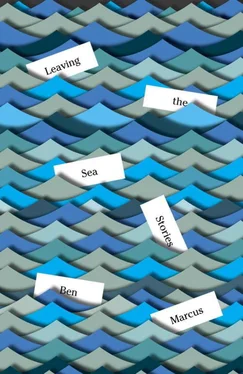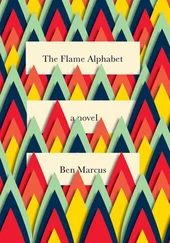This was the easy part. A straightaway down the lab’s hallway that would allow him to get himself together. Big goddamn ha, ha to that. He pulled his shirt as he walked, dug his thumbs between his belt and pants, deep into his gummy sides. You can’t very well hang on to yourself! The wise old maxim of someone important who was now rotting in a hole, a phrase lost to needlepoint and coffee mugs. He licked a finger on each hand and worked dry spit over his eyebrows. Such pointless grooming. If only he could shed a limb, or reach inside his face and reshape it so he looked, maybe, a small bit less Thomas-y. Let’s do a little work on that face, how about? As it was, his face looked as though someone had tried to reshape it and failed.
The colleague, in her cloud of superiority, had done her prep in private, no doubt. She was born prepped, Thomas thought, and he pictured her in adult form being birthed in a clean bright room somewhere to a team of scientists, who wiped her off, hosed her down, and fitted her in specialized gear so she could go out and make other people feel bad. She actually, probably, looked forward to such workplace sojourns like this, so she could flaunt her shit here and there and take everyone down a notch.
But was there a lower notch? Thomas wondered. Let’s invent a new notch, underground, and let’s get you nice and cozy there . He’d find out pretty soon, at the beverage cart, where the basic transaction of drink retrieval, the animal quest for hot, black fluid that Thomas rigorously pursued alone so as not to ever, and that would mean never, have to enter a discussion, would be precisely too long to undertake without some kind of conversational exchange.
The problem was that the beverage cart was lodged alone in an arena-sized space referred to by the laboratory staff—by pretty much anyone who worked and drank and ate and felt pain at Crawford Labs—as the Moors. The Moors was so misconceived architecturally that none of the so-called founders of Crawford could do anything except stash the coffee cart in it, stain it with some Germanic decorations that seemed spritzed from a hose—a hose with different ethnic tips—and hope not to die. Somewhere there were architects rubbing their hands together, laughing at the idiots who were daily demoralized in the spaces they designed. Demoralized, crushed, belittled, and then, for fun, desexed in the most complete possible way. Genitals flicked off neatly at the base. Holes smoothed over with one of those Photoshop tools. Bottoms filled in with putty.
The Moors may as well have had a genital-removal station you visited on your way out. Water-fountain height, retractable into the wall. Tilt in your hips and come back clean. And the egghead architects laughing and pointing, maybe even rubbing themselves into states of ecstasy. Their brains probably sat outside of their heads, simmering in jars of cola. It was a pornographic pleasure, no doubt, to watch people killed in buildings, killed slowly, brought near death and held in suspension simply by precalculated dimensions, by room design. Someone had already thought of this, he knew, the killing power of buildings, so, who cares, another great idea he could not claim as his own. Buildings were coffins, of course, but that came later. First they were killing machines. Did it matter to anyone how mixed that metaphor was, and where had he read that, anyway? It was probably one of those chapbooks that had been ribboned together as a wedding present for him and June, someone’s younger brother’s dissertation. Best wishes, here’s my brother’s piece of obscure scholarship. We love you guys! He didn’t remember ticking that off on the registry at the fucking Shoe Hole, or wherever he and Juney had listed the material bill of goods that would transform their ordinary marriage into a superpowered alliance.
No doubt there were cool loaves of data on a server somewhere devoted to the subject of architectural annihilation, and the theory was clearly infallible, Thomas thought, lumbering after the colleague, who was bouncing out of sight at the end of the hallway. Yet anyone who likened a building to a coffin, anyone who went public with what every known human in the world already totally accepted to be true, was officially considered an asshole.
Of course, the Moors must have been built to enable the kind of productivity that architects fantasized about while at work in their hoteliers—whatever those studios were called—where their young assistants, wearing T-shirts and no pants, rendered drawings, bound by contract, by the apprentice’s promise, to relieve impediments to their masters’ creativity. The Moors was probably meant to be a place where people would be thinking and performing at their best, why not, a blueprint premised on the belief that the actual people who would seize this space for their displays of high-performance creativity would not be defeated, tired, unattractive, and sad. Excepting our friend the colleague, of course. Immune to space. Sad-proofed. The Moors was designed for people who couldn’t be bothered to die on time. Architects don’t make buildings for people who are a bloody mess, just soup, really, because then there’d be no buildings, just tureens. Had there been a dissertation on that? Whose fat brother wanted to take that one on? Tenure fucking awaits . Vats would be trucked in from the factories, into which the people would be poured. Architects have somehow gotten away with thinking that people are not already technically dead, dead beyond repair, according to the accepted measurements, while really they are sloshing inside their clothing, walking spills. It is their first mistake, Thomas thought: believing they are not building coffins. Why weren’t architects simply called coffin makers?
This week there had so far been no birds, but birds would have seemed a mercy compared to the unknowable bundle of something breakable that had replaced them. Instead, the civic timekeeping strategy this week seemed to be a sickly wet thud that shook the entire building, bringing down a sudden hush on the analysis suite at Crawford Labs each time, as though a sack of something, something capable of feeling great pain, Thomas was certain, had plunged down outside, landing badly with what sounded like a sharp moan of grief. Each time he looked to the window today he saw nothing and heard nothing, and if his colleagues met his glance when he sought some kind of communion over this, uh, he wasn’t sure what to call it, they dragged their faces toward him with theatrical fatigue, as if he were a janitor coming to remove their trash: guilt, gratitude, and disgust smoking from their heads. He had taken a night course once and in the minor educational residue that remained he knew there was a word for when a group of people collectively ignored someone’s pain. A very fine word. Even the bland, bread-shaped people in his office, remarkably, had the higher functions of cruelty available to them and could serve up chilling displays of indifference. But whatever that term was for such a moral crime, it was fuzzed out now. Not that having the name for it would really help.
Thomas walked into the bright flat space, just steps after the colleague, and put his hand to his mouth. There was always this terrible adjustment. The smell was not of coffee so much as a burnt limb. Who knew what got cooked and killed here every night. Somewhere, no doubt, there was footage. This, then, was the Moors, a death space stained in beige, with a lone coffee cart, like a Tudor spacecraft, stuck into the floor. Windows, no sir. Doors, no sir. Octagonal space, check. Or, actually, maybe some other number of walls, one of them, if this was possible, slightly lower than the others: It wasn’t a four-sided room, that was for sure. He had done his romantic time in trick rooms; it was one of his favorite dates with June long ago, but this one fell short of the kind of optical illusions that gave you mild diarrhea or freaked you out or, for some reason, brought out the horn dog. The distorted low wall in the Moors felt more like a mistake, after the fact, and maybe now the Moors was only a trick room for people like him, with overfed faces and eyes so tired that everything they saw seemed crushed, shrunken, and slightly moist. Every room is a fun house if your face is broken .
Читать дальше












